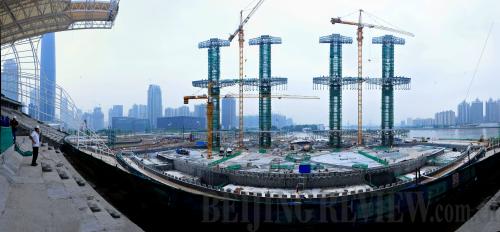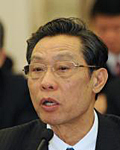|
 |
|
A HUGE PROJECT: Construction workers are busy building the opening ceremony staging area for the Guangzhou Asian Games on March 30, 2010 (LIN YI) |
 |
|
A STAR DEPUTY: Zhong Nanshan, a deputy to the National People's Congress from Guangdong Province, gives a speech at a panel discussion of national lawmakers on March 13. In February, his inquiry into the Guangzhou Asian Games' budget stirred a heated debate in the host city in south China's Guangdong Province (MA ZHANCHENG) | The 16th Asian Games are becoming a financial concern instead of a proud moment to residents in the host city Guangzhou, in south China's Guangdong Province.
On February 21-25, the Guangzhou Municipal People's Congress, the local legislature, held its annual session.
According to the draft of Guangzhou's 2011 budget, which was submitted by the Guangzhou Municipal Bureau of Finance for lawmakers' approval, more than 38 million yuan ($5.56 million) will be allocated to programs related to the Asian Games.
"The allocations will be used to offset money spent on training volunteers and throwing a reception for foreign guests during the Games. They will also help fund the documentation of the Games," the draft says.
Some local lawmakers criticized the sporting spectacle Guangzhou hosted last year of having left the city with a huge deficit.
Although more than four months have passed since the Games ended, the Guangzhou Government hasn't yet provided a breakdown of the total expenditure.
Zhang Jieming, Director of the Guangzhou Municipal Bureau of Finance, told Guangzhou-based Southern City News that it was too soon to know the exact expenditure of such a huge project.
He promised to unveil a detailed financial breakdown of the budget and expenditure in 2013.
Budget in the clouds
During the annual session, Zhong Nanshan, doctor and an outspoken academician with the Chinese Academy of Engineering, claimed there was a big financial gap after the local authorities invested what he claimed was 257.7 billion yuan ($39.29 billion) in the Games.
Zhong, who has been a deputy to the Guangzhou Municipal People's Congress since 2003, said Guangzhou had only expected to spend 195 billion yuan ($29.73 billion) on the Games. He claimed the deficit from the Games and the previous outstanding loans the city ran up during the past five years had left it owing some 210 billion yuan ($32.02 billion).
"How will the city government find the money to improve people's living standards with such heavy debts to pay in the years ahead?" Guangzhou Daily quoted Zhong as saying.
The inquiry by Zhong fuelled a fresh debate on the Games' budget, which has never been detailed by the government.
Many other deputies joined Zhong in calling on the government to unveil its official report on the cost of the Games.
"It's unacceptable to just spend money on the Asian Games without telling the Guangzhou Municipal People's Congress and its Standing Committee how much the expenditure is," said Huang Jianwu, a law professor at Sun Yat-sen University, at a panel discussion of lawmakers on February 21.
Luo Jingjun, Director of the Information Department of the Organizing Committee of the 16th Asian Games, however, played down the issue. He said if it hadn't been for the Asian Games, Guangzhou would definitely not be the international city that it is today.
"These are two different matters," said Huang.
"The Asian Games has certainly helped raise the international recognition of Guangzhou and improve peoples' livelihoods. Of course money had to be spent. The problem is that the government initially said it would spend 2 billion yuan ($304.95 million), but then repeatedly changed the budget. Were these changes ever reported to the Municipal People's Congress? Of course there were reasons behind the changes, but did the government respect the Municipal People's Congress or the will of the people when making these decisions?"
According to Huang, at a meeting held by the State Council in 2005, the Guangzhou Municipal Government reportedly said Asian Games spending would not exceed 2 billion yuan. "When compared with the actual amount spent, it is clear that the original stated budget was way too conservative," he said.
Huang said if the problem wasn't fully addressed then things would only get worse in the future.
Official response
"Guangzhou's budget revenue was less than 100 billion yuan ($15.25 billion) last year. Where does its huge investment in the Games come from? The government should give the public an explanation," said Zheng Jinping, a deputy to the Guangdong Provincial People's Congress.
In response, Director Zhang of the Guangzhou Municipal Bureau of Finance said the Asian Games' income and expenditure were balanced.
"I don't know what sources Zhong Nanshan cited. You reporters should ask him how he got his figures," Zhang told Guangzhou-based Yangcheng Evening News.
The Games' direct expenditure was 13.6 billion yuan ($2.07 billion), with more than 100 billion yuan going to projects for improving urban infrastructure in the past five years, Zhang said.
So far, the city has used some 9.1 billion yuan ($1.39 billion), accounting for 67 percent of the budget, according to Zhang.
"I can say that the investment has been kept within the budget," Zhang said. "The funds come mainly from the marketing activities of the Games, subsidies from provincial and central governments and sales of property in the Asian Games Town in Panyu District."
It was the first time that a Guangzhou official had revealed the budget for the Asian Games, but Zhang said the government would not be able to provide full details of the Game's spending until 2013 because there was a lot of follow-up work to do, the Southern City News said.
Zhang said he was forced to release the number, even though the report was not completed, because of the debate over the Asian Games' spending triggered by Zhong's speech.
"Actually, the government debt is not as high as the figure some deputies to the Municipal People's Congress mentioned," Zhang said.
Early in 2002, when Guangzhou launched a bid to host the 2010 Asian Games, it planned a budget of about 12.1 billion yuan ($1.85 billion) for the Games, according to Zhang.
However, local authorities submitted an investment plan of as high as 220 billion yuan ($33.55 billion) to the Central Government after it won the bid.
"The 220-billion-yuan plan includes the building of competition venues, the Asian Games Town and some key infrastructure projects from 2005 to 2010. That's why some people say that Guangzhou has invested a huge amount of money to host the Games," Zhang said.
The city invested as much as 109 billion yuan ($16.62 billion) to improve municipal infrastructure from 2005 to 2010, according to Zhang.
Before the Games' opening, Guangzhou Mayor Wan Qingliang said the investment in the Games had been kept within the budget and amounted to about 120 billion yuan ($17.57 billion).
Zhang said total expenditure related to the Asian Games was about 130 billion yuan ($19.03 billion) when other costs were included.
"At present, the government owes 88.4 billion yuan ($12.94 billion) from urban construction over the past several years, including debt interest," Zhang said.
Zhang said that it is a common practice for local governments to raise money for urban construction through government debts.
Unsolved debate
However, Zhong was not satisfied with Zhang's explanation.
Zhong, also a deputy to the National People's Congress, pledged to raise the issue with the Central Government.
Zhong said he understood Zhang might be facing difficulties and his main purpose in raising the issue was to ask for more support for Guangzhou.
Guangzhou's total fiscal revenue was 334.8 billion yuan ($51.06 billion) in 2010, of which more than 240 billion yuan ($36.60 billion) was turned over to the provincial and central authorities, according to the Guangzhou Municipal Bureau of Finance.
This year, Guangzhou has a budget for disposable government expenditure totaling 103.8 billion yuan ($15.83 billion).
"Guangzhou contributes a great deal of tax to central and provincial governments every year," he said. "With such heavy expenditure on the Asian Games, the city is in difficulty and the Central Government should give some support to it." | 